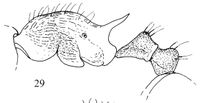Temnothorax eburneipes
| Temnothorax eburneipes | |
|---|---|

| |
| Scientific classification | |
| Kingdom: | Animalia |
| Phylum: | Arthropoda |
| Class: | Insecta |
| Order: | Hymenoptera |
| Family: | Formicidae |
| Subfamily: | Myrmicinae |
| Tribe: | Crematogastrini |
| Genus: | Temnothorax |
| Species: | T. eburneipes |
| Binomial name | |
| Temnothorax eburneipes (Wheeler, W.M., 1927) | |
Semixerophilous species. In North Korea it lives mostly in a lower altitude, up to 500 m a.s.l., where it inhabits mainly open, relatively dry grasslands with sandy or stony soil, shrubs, rarely found in young, sparse forests (pine, oak, maple). In Myohyang Mts it inhabits also mountain meadows up to 900 m a.s.l. (Radchenko 2004)
Identification
Radchenko (2004) - T. eburneipes is most similar to Temnothorax taivanensis and differs from it by the shape of the petiole, which is shorter, with relatively short anterior peduncle (PI < 1.40), and with a very weakly concave anterior face (in T. taivanensis the petiole is much longer, with very long anterior peduncle, PI > 1.60, and a strongly concave anterior face); distinctly longer propodeal spines (ESLI = 0.49–0.52 vs. ESLI = 0.40), and by the sculpture of head and alitrunk. In T. eburneipes the frons is finely longitudinally striated laterally and smooth in the middle; the lateral parts of the head dorsum reticulate, but surface appears shiny; the sides of alitrunk finely striated and partially punctate, appears shiny. In T. taivanensis the sides of the alitrunk and the head dorsum are quite coarsely longitudinally rugose, surface between the rugae very finely superficially punctate, but on the alitrunk smooth and shiny. T. eburneipes differs from Temnothorax spinosior by relatively longer propodeal spines (ESLI = 0.49–0.52 vs. 0.36–0.41) and by the higher petiole with a narrowly rounded, less massive petiolar node dorsum (PI < 1.40 vs. > 1.50).
Keys including this Species
Distribution
Latitudinal Distribution Pattern
Latitudinal Range: 29.733333° to 29.733333°.
| North Temperate |
North Subtropical |
Tropical | South Subtropical |
South Temperate |
- Source: AntMaps
Distribution based on Regional Taxon Lists
Palaearctic Region: China (type locality), Democratic Peoples Republic of Korea.
Distribution based on AntMaps
Distribution based on AntWeb specimens
Check data from AntWeb
Countries Occupied
| Number of countries occupied by this species based on AntWiki Regional Taxon Lists. In general, fewer countries occupied indicates a narrower range, while more countries indicates a more widespread species. |

|
Estimated Abundance
| Relative abundance based on number of AntMaps records per species (this species within the purple bar). Fewer records (to the left) indicates a less abundant/encountered species while more records (to the right) indicates more abundant/encountered species. |

|
Biology
Castes
Nomenclature
The following information is derived from Barry Bolton's Online Catalogue of the Ants of the World.
- eburneipes. Leptothorax congruus var. eburneipes Wheeler, W.M. 1927e: 1 (w.) CHINA. Raised to species: Wheeler, W.M. 1929f: 8. Combination in Temnothorax: Bolton, 2003: 271.
Unless otherwise noted the text for the remainder of this section is reported from the publication that includes the original description.
Description
Type Material
Radchenko (2004) - 3 workers, syntypes, “Kuliang near Kiu-Kiang, China, N. Gist Gee”, “M.C.Z. Type 1–9 22618”, “Syntypes Leptothorax congruus var. eburneipes Wheeler” (Museum of Comparative Zoology).
References
- Bolton, B. 2003. Synopsis and Classification of Formicidae. Mem. Am. Entomol. Inst. 71: 370pp (page 271, Combination in Temnothorax)
- Qian, Y.-H., Xu, Z.-H. 2024. Taxonomy of the ant genera Leptothorax Mayr, 1855 and Temnothorax Mayr, 1861 (Hymenoptera: Formicidae) of China with descriptions of twenty-eight new species and a key to the known Chinese species. European Journal of Taxonomy 936, 1-97 (doi:10.5852/ejt.2024.936.2569).
- Radchenko, A. 2004. A review of the ant genera Leptothorax Mayr and Temnothorax Mayr (Hymenoptera, Formicidae) of the Eastern Palaearctic. Acta Zoologica Academiae Scientiarum Hungaricae. 50(2):109-137.
- Wheeler, W. M. 1927d. Chinese ants collected by Professor S. F. Light and Professor N. Gist Gee. American Museum Novitates 255: 1-12 (page 1, worker described)
- Wheeler, W. M. 1929g. Some ants from China and Manchuria. American Museum Novitates 361: 1-11 (page 8, Raised to species)
- Zhou, S., Huang, J., Yu, D., Liu, Z. 2010. Eight new species and three newly recorded species of the ant genus Temnothorax Mayr (Hymenoptera: Formicidae) from the Chinese mainland, with a key. Sociobiology. 56(1):7-26.
References based on Global Ant Biodiversity Informatics
- Guénard B., and R. R. Dunn. 2012. A checklist of the ants of China. Zootaxa 3558: 1-77.
- Radchenko A. 2004. A review of the ant genera Leptothorax Mayr and Temnothorax Mayr (Hymenoptera, Formicidae) of the eastern Palaearctic. Acta Zoologica Academiae Scientiarum Hungaricae 50:109-137.
- Radchenko, A. 2005. Monographic revision of the ants (Hymenoptera: Formicidae) of North Korea. Annales Zoologici (Warsaw) 55: 127-221.
